Key takeaways:
- Referral programs enhance customer trust and loyalty by fostering personal connections, making recommendations more impactful than traditional advertising.
- Cost-effectiveness and organic growth through word-of-mouth are significant benefits, leading to higher conversion rates compared to conventional marketing methods.
- Engaging storytelling and incentivizing referrals can motivate participation, while maintaining connections with referred customers can strengthen relationships and encourage further advocacy.
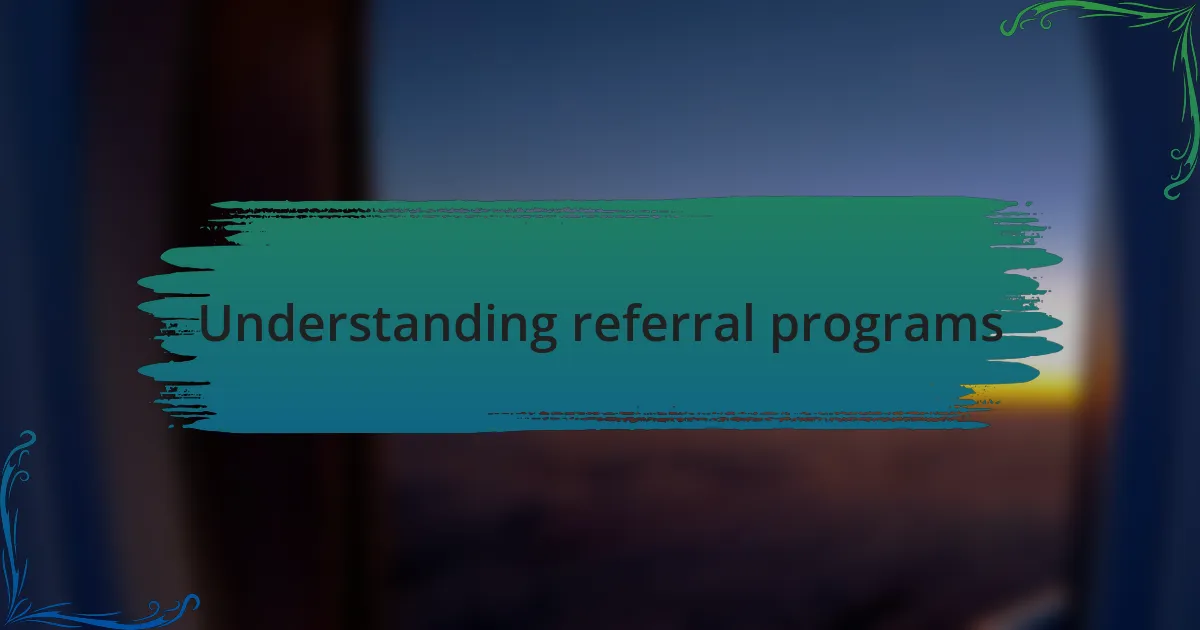
Understanding referral programs
Referral programs can transform the way we think about promotions and customer loyalty. I remember when I first encountered one; a familiar face recommended a service to me, and in doing so, not only did I receive a discount, but I felt a deeper bond with that brand. It made me wonder—how much does trust influence our decision-making?
These programs thrive on leveraging personal networks, creating a win-win situation for both referrers and referrals. For instance, when a friend referred me to a travel agency that offered incredible deals, I appreciated their genuine recommendation. It made me realize that personal connections often carry more weight than traditional advertising.
Understanding these programs is not just about mechanics; it’s about the relationships they foster. Have you ever paused to think about how a simple recommendation can open doors to new experiences? It’s clear to me that businesses, like Thai Airways, can benefit immensely by encouraging satisfied customers to share their positive experiences.
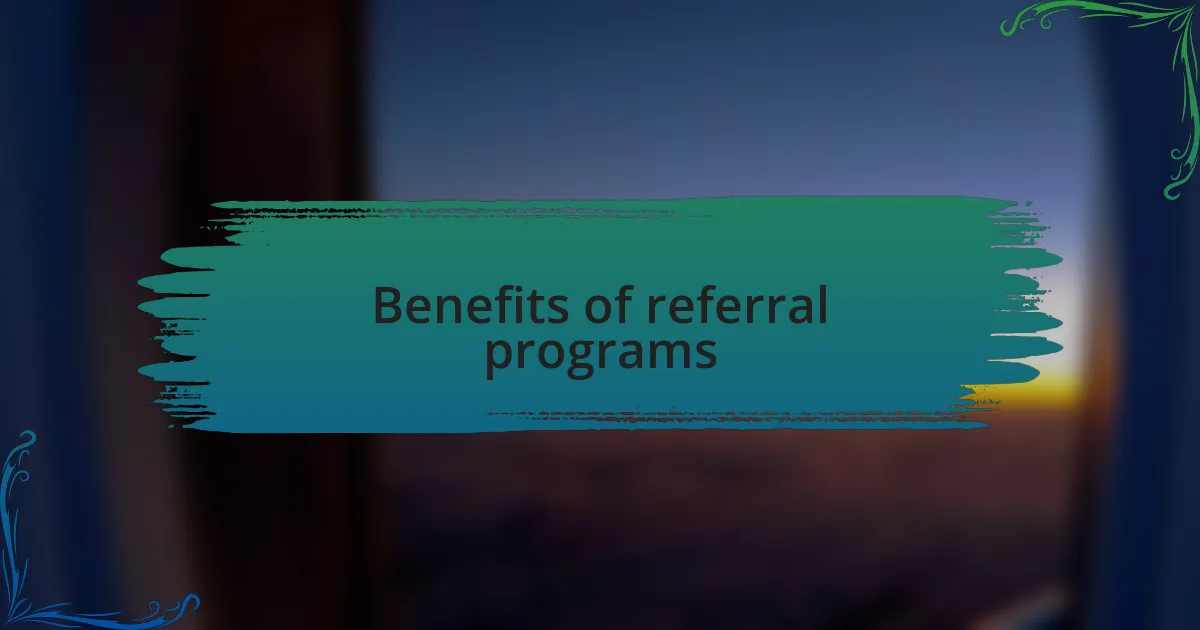
Benefits of referral programs
Referral programs offer not just customer acquisition but also enhance trust and loyalty. When I think back to my own experience with a hotel referral, I remember feeling a twinge of excitement knowing I was stepping into a place my friend had genuinely loved. It feels good to share something meaningful, strengthening not just my bond with the referrer but also my connection to the brand. How often would we overlook a service without that personal endorsement?
Another significant benefit is the cost-effectiveness of these programs. Unlike traditional advertising, where companies sink vast sums into campaigns, referral programs encourage organic growth through word-of-mouth. I distinctly recall how I discovered a fantastic airline deal simply because a colleague shared it during a casual conversation. This approach feels more genuine and approachable, often leading to higher conversion rates. Isn’t it fascinating how much more convincing a friend’s recommendation can be than a slick ad?
Additionally, referral programs can create a community around a brand. Companies like Thai Airways tap into this dynamic by fostering repeated interactions among satisfied travelers. I vividly recall how engaging with fellow travelers in a forum after my referral experience deepened my appreciation for the airline. The sense of belonging can enhance customer loyalty, making it more than just a transactional relationship—it’s about shared experiences and stories, forming a tapestry of connection that traditional marketing simply can’t replicate.
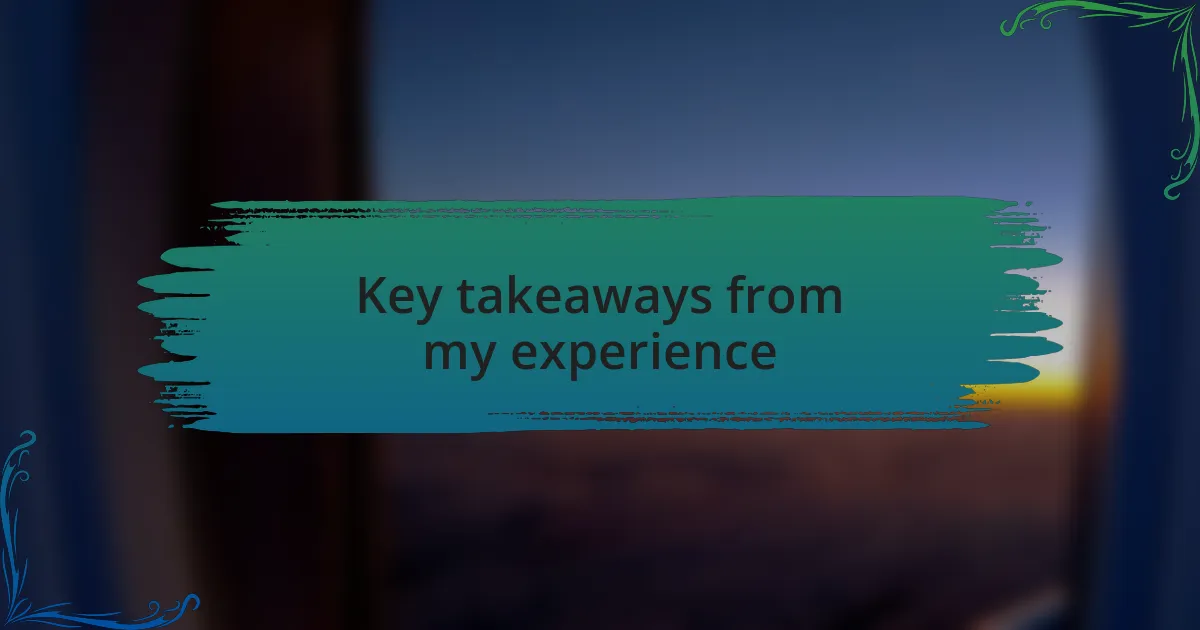
Key takeaways from my experience
Reflecting on my experiences with referral programs, I’ve found that genuine connections often lead to the best recommendations. I remember referring my family to a travel service after my fantastic trip with Thai Airways. The excitement in their voices, mixed with a hint of curiosity, emphasized how personal endorsements spark enthusiasm. Isn’t it remarkable how sharing a memorable journey can open doors to new experiences for others?
Another key takeaway for me has been the trust factor inherent in referrals. I once hesitated to book with an unfamiliar airline until a trusted friend sang its praises. The stories she shared about her seamless travels made all the difference for me. This just goes to show how a personal touch can dismantle our preconceived hesitations—wouldn’t it be wonderful if more businesses recognized and harnessed this power?
Lastly, the emotional engagement stemming from referral programs cannot be overlooked. When I signed up for that same airline’s loyalty program through a referral, it felt like gaining a VIP pass into a new world of travel. The thrill of knowing that I was joining a community steeped in shared stories and experiences sparked a deep sense of belonging. Have you ever felt that rush when you connect with a brand through someone else’s glowing experience? It’s those moments that turn mere customers into enthusiastic advocates.
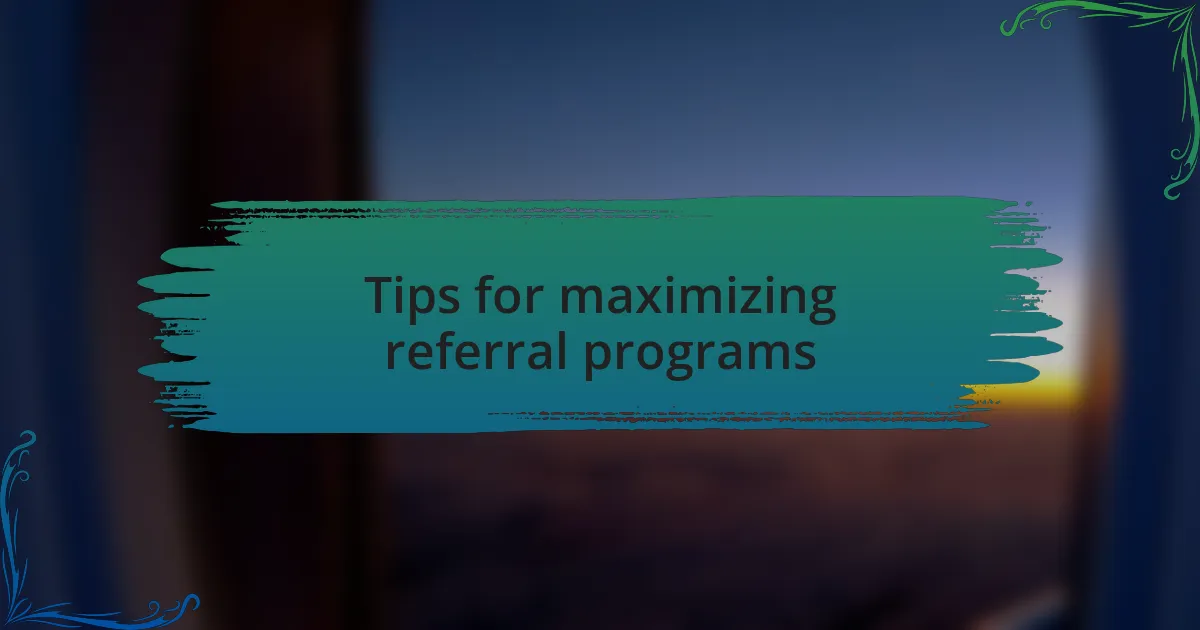
Tips for maximizing referral programs
To truly maximize referral programs, it’s crucial to create engaging content that resonates with your audience. I recall crafting a personal blog post about my incredible journey with Thai Airways and how sharing those vivid details not only captured attention but also inspired others to consider the airline for their adventures. Have you thought about how your storytelling could not only inform but also ignite curiosity in your readers?
Another effective strategy is incentivizing referrals. Once, when discussing an airline with friends, I mentioned how a friend had received travel credits for each successful referral. This created an enthusiasm that really drove my friends to sign up and share their own experiences. What are some incentives you could offer that would motivate your network to participate?
Finally, staying engaged with those you’ve referred can lead to valuable feedback and strengthen your network. I remember reaching out to friends who had used my referral to ask about their experiences. Their responses not only helped me build trust, but also enriched my understanding of their needs. How often do you check in with your referrals to maintain that connection? It’s the kind of follow-up that transforms one-time users into loyal advocates.
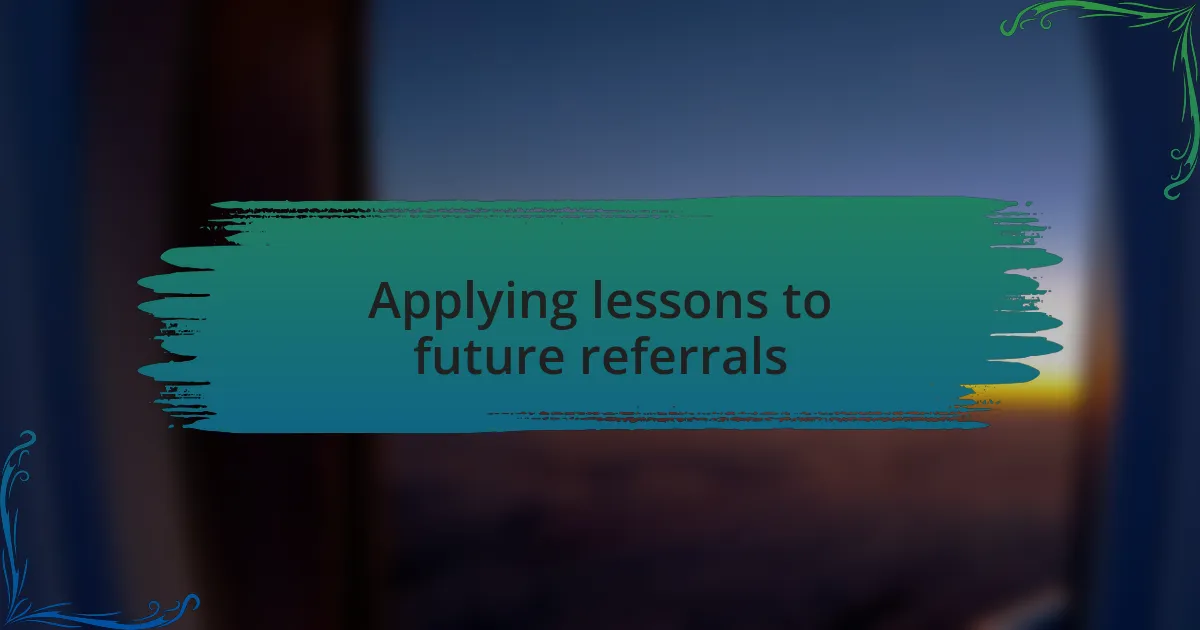
Applying lessons to future referrals
When considering how to apply lessons from past referral experiences to future efforts, I find it essential to evaluate what truly drove engagement. I remember a time when a simple conversation about Thai Airways turned into a passionate discussion about travel experiences. I realized that when I connected emotionally with my audience, the responses were more enthusiastic and meaningful. How can you tap into those emotional connections in your future referrals?
Moreover, I discovered the value of follow-up as a potent tool. After successfully referring a friend who then traveled with Thai Airways, I took the time to reach out and ask about their journey. Their excited recounting not only made me feel connected but also inspired me to share those experiences with others. What stories from your referrals could be shared to create a ripple effect of enthusiasm and engagement?
Lastly, I believe that analyzing the success of previous referrals can illuminate patterns for future strategies. By tracking which aspects of my referrals led to conversions, like timing or messaging, I could tailor my approach for better results next time. Are you keeping notes on what works and what doesn’t in your referral process? This reflection can be a game-changer for refining and enhancing your referral initiatives.